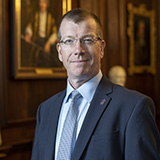As both the BMA and the Royal College of General Practitioners move towards seeking their members’ views on assisted dying, I have been reflecting on some of the misinformation I continue to hear about, and misrepresentation of, the position of the Royal College of Physicians (RCP).
In a survey carried out by the RCP between 5 February and 1 March 2019, of 6885 respondents from more than 30 specialties, 43% said that the RCP should oppose a law change, 32% that the RCP should support a law change, and 25% that the RCP should be neutral. Given the result of the previous survey in 2014, our Council had decided in 2018 that a supermajority of 60% either supporting or opposing a change in the law would be needed to adopt that position. If not a neutral position should be adopted.
The RCP’s position was confirmed following our Council meeting on 21 March, when almost all of Council (36 to 1) voted for the college to adopt a neutral position on whether the law should change to permit assisted dying. We had not adopted a neutral position before that (well, not since 2006, when we held a neutral position).
Furthermore, the matter was also discussed at length at our annual general meeting in April, and it was agreed that the RCP should move on and focus on other issues.
There is no ongoing legal case against the college. An application for a judicial review was brought to the High Court at the beginning of March concerning the legality of four aspects of the survey methodology: namely that the RCP should have consulted with members and fellows before running the survey, that legitimate expectations had been breached, that inadequate reasons had been given to members and fellows, and that the decision to introduce a supermajority was irrational.
The High Court rejected the application on all four counts. In her decision dated 20 March, Mrs Justice Elizabeth Laing, DBE was clear that the RCP’s approach to our survey was “not arguably irrational.” Furthermore, the judge said that in any event “judicial review should be refused… because of the actual results of the poll” on the ground that “even if a simple majority had been required, there was not a simple majority in favour of the proposition that the [RCP’s] public position should be to oppose a change in the law.”
The claimants had also asked the High Court to “restrain publication of the results of the poll.” This application was withdrawn shortly before the High Court’s decision was shared with the parties. In any event, in her decision Mrs Justice Laing rejected that application on grounds that restraining publication of the results would constitute a disproportionate interference with the RCP’s freedom of expression and would be unlikely to succeed at trial. I found this attempt to silence the opinion of members interesting.
The Charity Commission also refused consent to bring a challenge against the RCP under charities legislation. However, I understand that the claimants may now have made an application to court to overturn the Charity Commission’s decision.
Despite the High Court ruling, the survey methodology continues to attract some criticism, but the process was such that RCP Council are confident that the result was accurate and that the college’s move to a neutral stance on whether the law should permit assisted dying was fair. Having said that, the use of external agencies for future polling may reassure concerns, and this is something the Council should consider when repeating the survey.
Contrary to rumour, the survey and our policy have not resulted in a huge exodus of members: membership continues to rise month by month. This is a credit to all the committed physicians involved with the RCP and their work in all aspects of the RCP’s life. Yes our members hold diverse views, but that is a good thing for the RCP, and with the survey done, acceptance of divergent views can allow the membership to focus on our common challenges.
Since January I have spoken at many open meetings, to a total of almost 2000 members and fellows around the country. The RCP’s assisted dying survey has come up only once in questions. Workforce and wellbeing issues, on the other hand, come up at every meeting, and these are matters on which we will continue to campaign actively.
Although it has been difficult to reach consensus on the RCP’s position on assisted dying law, I am very happy that we conducted the recent survey more transparently and to as high a standard as we did in both previous exercises (in 2014 and 2006). It has not been an easy process, but it was the right thing to do. I would never call the survey “a mistake,” and anyone claiming that I have said this is wrong.
For the record, it would have been a big mistake to bow to pressure from a few critics and not go ahead with the survey. I and the RCP Council are happy with the position we now hold and the way that position was decided. Being neutral allows the RCP to engage fully with the debate and continue to represent those who are opposed as well as those who are supportive of a change in the law on this issue.
 Andrew Goddard, President of the Royal College of Physicians
Andrew Goddard, President of the Royal College of Physicians
Competing interests: None declared
Photo credit: Joe D Miles
